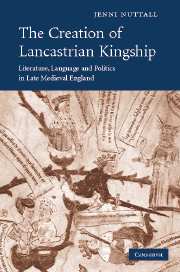Book contents
- Frontmatter
- Contents
- Acknowledgements
- Note on quotations and references
- Note on editions
- Abbreviations
- Introduction
- PART I HOUSEHOLD NARRATIVES
- 1 Stereotyping Richard and the Ricardian familia
- 2 The dissemination of the Ricardian stereotype
- 3 Politicizing pre-existing languages
- 4 From stereotypes to standards
- 5 Household narratives in Lancastrian poetry
- PART II CREDIT AND LOVE
- Conclusion: Lancastrian conversations
- Notes
- Bibliography
- Index
- CAMBRIDGE STUDIES IN MEDIEVAL LITERATURE
4 - From stereotypes to standards
Published online by Cambridge University Press: 27 October 2009
- Frontmatter
- Contents
- Acknowledgements
- Note on quotations and references
- Note on editions
- Abbreviations
- Introduction
- PART I HOUSEHOLD NARRATIVES
- 1 Stereotyping Richard and the Ricardian familia
- 2 The dissemination of the Ricardian stereotype
- 3 Politicizing pre-existing languages
- 4 From stereotypes to standards
- 5 Household narratives in Lancastrian poetry
- PART II CREDIT AND LOVE
- Conclusion: Lancastrian conversations
- Notes
- Bibliography
- Index
- CAMBRIDGE STUDIES IN MEDIEVAL LITERATURE
Summary
Richard the Redeless shows us that the Crown's depositional rhetoric became expanded and modified as it emerged in literary form. Henry IV and his advisers were therefore faced with a range of responses to the deposition schedule which they may not have expected. Such freedom and nonconformity is a property of language itself, especially those parts of a language which are ideologically or politically significant and hence strongly contested. Pocock stresses a speaker's or writer's inability to control the reception and application of his own statements. Listeners or readers impute to his utterances ‘consequences, implications and entailments he may not have intended or wish to acknowledge and they will respond to him in terms determined by these imputations’. The paradigms prioritized by the deposition schedule altered the nature of political debate in unforeseen ways, encumbering the Lancastrian Crown with consequences which it had not fully envisaged.
Appropriation of these paradigms by others occurred because they were available and possessable rather than exclusive and monopolized. The new Lancastrian Crown temporarily claimed ownership of these paradigms, but their ownership could not be guaranteed and their commitment to the values embodied within these paradigms could be doubted. Observers were highly aware that the Lancastrian deployment of positive and negative stereotypes of kingship was a temporary manipulation of rhetoric to achieve a particular political end.
- Type
- Chapter
- Information
- The Creation of Lancastrian KingshipLiterature, Language and Politics in Late Medieval England, pp. 41 - 54Publisher: Cambridge University PressPrint publication year: 2007



